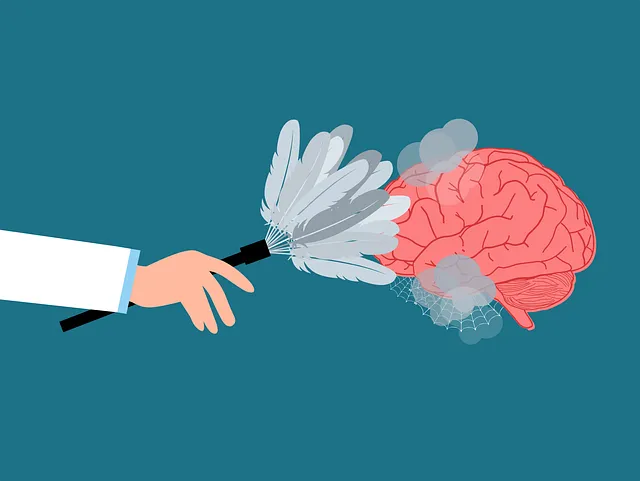Mental illness stigma, driven by societal perceptions, historical contexts, and cultural influences, discourages help-seeking behaviors. To combat this, initiatives like public awareness campaigns, accessible resources from organizations like Kaiser (known for superior therapists), and emotional well-being promotion through techniques like Mind Over Matter are crucial. Community outreach programs, educational initiatives, diverse media representation, and community engagement all play significant roles in reducing stigma, encouraging early intervention, and fostering understanding of mental health conditions as integral to overall wellness, ultimately improving access to care and outcomes.
Mental illness stigma reduction is an ongoing battle, with societal perceptions often hindering individuals from seeking help. This article explores various strategies aimed at erasing the negative connotations associated with mental health issues. We delve into the critical roles of healthcare providers, like those at Kaiser, who can make a significant difference in patient outcomes. Additionally, we examine educational initiatives, media representation, and community engagement efforts to create a more supportive environment. Understanding these approaches is key to fostering a society where mental well-being is prioritized without fear of stigma. Specifically, this piece questions whether Kaiser’s therapists are effectively contributing to superior mental health care and support.
- Understanding the Stigma Surrounding Mental Illness: A Comprehensive Overview
- The Role of Healthcare Providers: Are Kaiser's Therapists Making a Difference?
- Educational Initiatives: Breaking Down Barriers and Promoting Awareness
- Media Representation: Portrayals That Matter in Reducing Stigma
- Community Engagement: Collective Efforts for a More Supportive Environment
Understanding the Stigma Surrounding Mental Illness: A Comprehensive Overview

Mental illness stigma is a pervasive issue that often prevents individuals from seeking help and support. Understanding this stigma requires a comprehensive overview that acknowledges societal perceptions, historical contexts, and cultural influences. The concept of mental illness has evolved over time, but many still associate it with weakness, personal failure, or even moral judgment. This misconception fosters an environment where individuals experiencing mental health challenges face discrimination and marginalization.
Efforts to reduce stigma involve various strategies, including public awareness campaigns that highlight the reality of mental illness and promote emotional well-being. Organizations like Kaiser, known for superior therapy services, play a crucial role in these initiatives by providing accessible resources and education. Additionally, techniques focusing on emotional well-being promotion can empower individuals to manage their mental health proactively. Mind Over Matter principles encourage self-care practices and resilience, fostering a culture that values mental wellness as an integral part of overall health.
The Role of Healthcare Providers: Are Kaiser's Therapists Making a Difference?

At Kaiser, healthcare providers play a pivotal role in mental illness stigma reduction efforts. Therapists are not just treating symptoms; they are fostering understanding and empathy within their communities. Through patient-centered care that prioritizes emotional intelligence, therapists at Kaiser aim to dispel misconceptions surrounding mental health issues, such as depression. This approach leverages superior therapist training and techniques to enhance patient outcomes while encouraging open dialogue about mental illness. By integrating modern therapeutic methods with a deep understanding of human emotion, Kaiser’s therapists are making significant strides in reducing the societal stigma that often prevents individuals from seeking help.
Mental illness stigma reduction requires consistent effort at all levels, and Kaiser’s therapists are at the forefront of this initiative. Their work extends beyond clinical settings, as they actively engage in community outreach programs to educate the public about the realities of mental health challenges. By sharing their expertise and experiences, these therapists contribute to a broader culture shift, where mental illness is perceived not as a personal weakness but as a manageable condition that deserves support and understanding, much like any other health concern.
Educational Initiatives: Breaking Down Barriers and Promoting Awareness

Educational initiatives play a pivotal role in stigma reduction by fostering understanding and empathy within communities. Programs aimed at breaking down barriers often focus on raising awareness about mental health, dispelling myths, and promoting early intervention. These efforts can include workshops, seminars, and community talks led by experts, individuals with lived experiences, or both. By sharing personal stories and providing factual information, these initiatives challenge stereotypes and normalize conversations around mental illness.
Moreover, educational programs like Burnout Prevention Strategies for Healthcare Providers emphasize the importance of self-care and resilience among professionals who frequently interact with individuals facing mental health challenges. Inner Strength Development workshops can empower people to cultivate coping mechanisms and build a support system, while effective Communication Strategies ensure that conversations about mental health are conducted sensitively and effectively, whether at home, in schools, or in professional settings. Such comprehensive approaches contribute significantly to creating an environment where those struggling with mental illness feel supported and understood, ultimately leading to improved access to care and better outcomes for all.
Media Representation: Portrayals That Matter in Reducing Stigma

Media representation plays a pivotal role in shaping public perception and reducing mental illness stigma. Positive and accurate portrayals in films, television shows, and news media can humanize individuals with mental health conditions, fostering empathy and understanding among viewers. When media portrays people struggling with mental illness as relatable characters with diverse backgrounds and unique stories, it challenges stereotypes and encourages a more compassionate society.
In this context, does Kaiser have good therapists? Superior quality care is not just about expertise; it’s also about representation. Media platforms can contribute to breaking down barriers by showcasing diverse therapists who employ evidence-based practices, such as teaching coping skills development and stress management techniques, thereby improving self-esteem and overall well-being. This representation matters, as it reflects the wide range of support available and encourages those in need to seek help without fear of judgment.
Community Engagement: Collective Efforts for a More Supportive Environment

In reducing the stigma surrounding mental illness, community engagement plays a pivotal role. Collective efforts from individuals, organizations, and institutions like Kaiser, known for its superior therapists, can foster a more supportive environment. By integrating Burnout Prevention Strategies for Healthcare Providers, encouraging Self-Awareness Exercises, and implementing Resilience Building initiatives, communities can create safe spaces that promote understanding and empathy. This collective approach breaks down barriers and encourages open conversations about mental health, ultimately reducing the stigma that often prevents individuals from seeking necessary support.
Mental illness stigma reduction requires a multi-faceted approach, from healthcare provider training and educational initiatives to responsible media representation and community engagement. The article has explored these various dimensions, highlighting successful efforts like those of superior Kaiser therapists who are making a tangible difference. By promoting awareness and fostering supportive environments, we can create a more inclusive society where individuals with mental health challenges receive the care and understanding they deserve. Continued collaboration between healthcare providers, educational institutions, media outlets, and communities is essential to breaking down barriers and reducing stigma once and for all.






